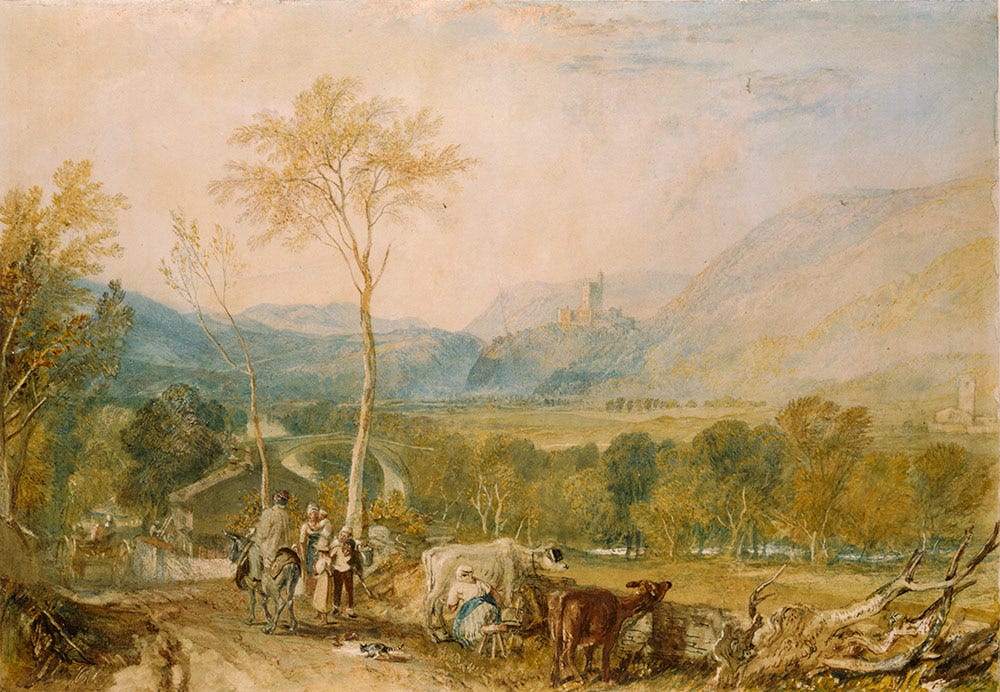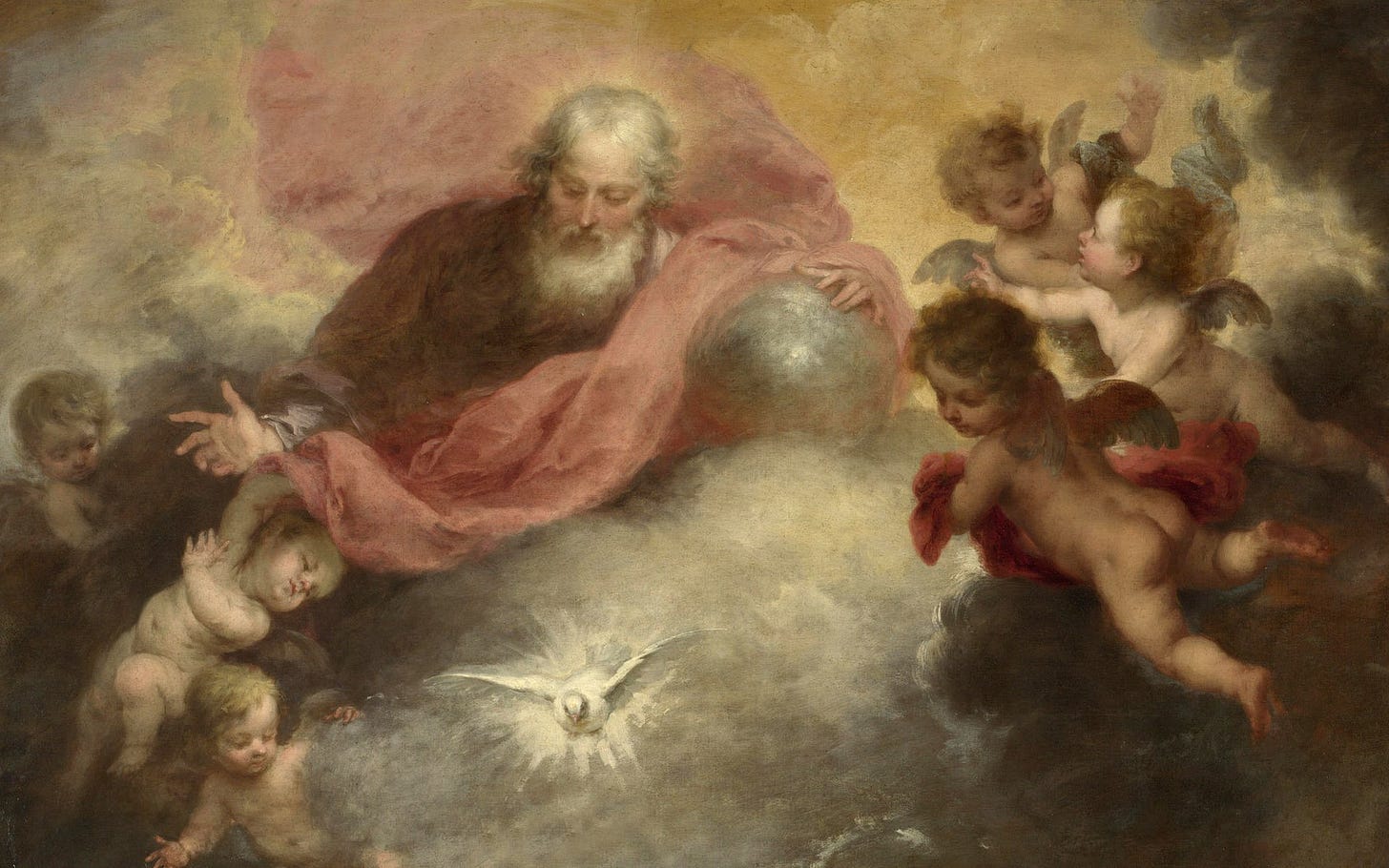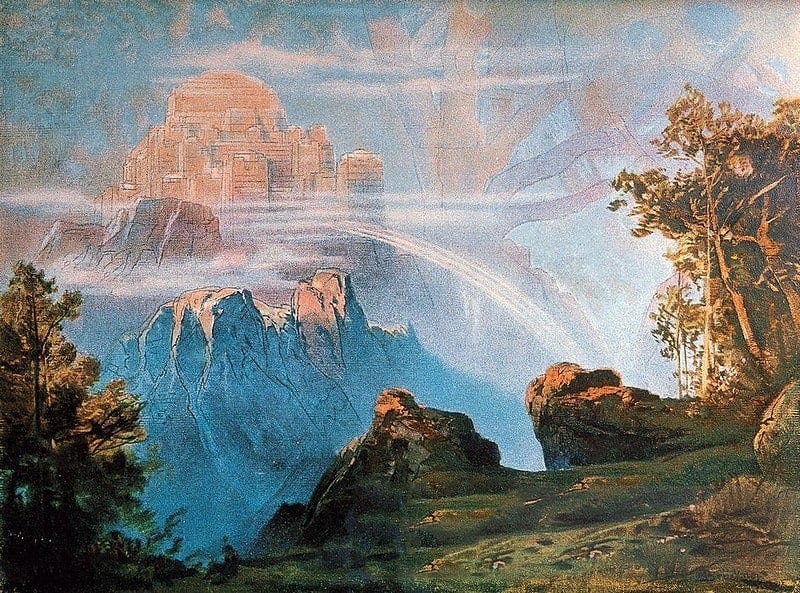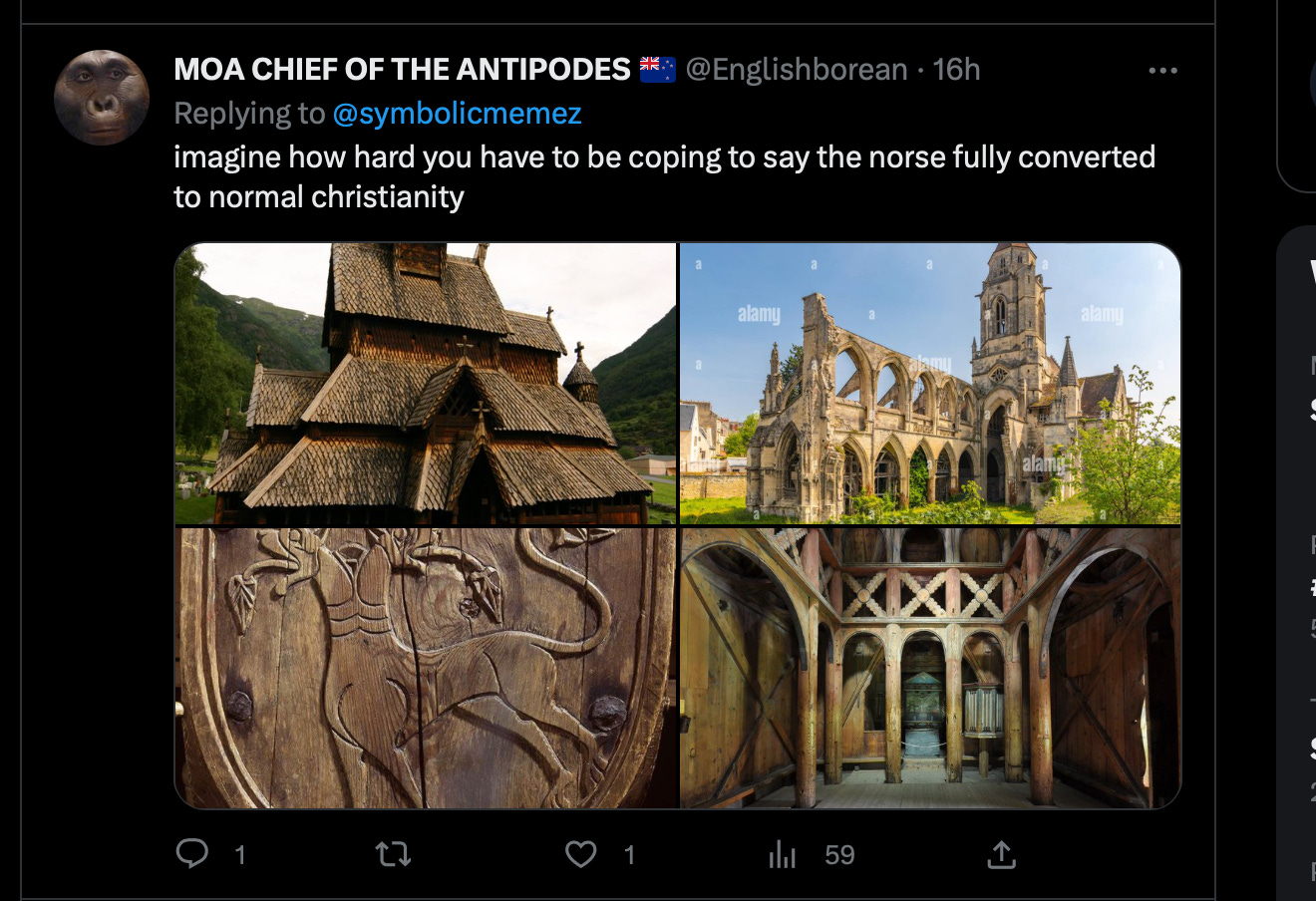There has been much debate between Christians and Neo-Pagans in online spheres on the relationship between Christianity and the ancient European pagan faiths.
There’s a few camps you’ll find in these debates:
European Christians that consider any religious belief in Europe pre-christianization to be demon worship or idolatry. They usually disregard all ancient myth (with the exception of the Hebrew variety) as “demonic propaganda” or “distortions" of the truth. You especially find these types in Protestant America, where they have lost essentially all genuine connection to their own heritage. These Christians tend to idolize Jewish culture and mythology, and are happy that ancient European culture has largely disappeared from the church.
Pagans that see Christianity as a foreign desert religion with no relevance to the European people or their spirit. They hold the belief that Christian morality ruined and subverted the more noble, militant, honor based European ethos. They see Christian and “European pagan” paradigms as inherently at war with one another. They believe Christianity is a Jewish faith.
European Christians that believe there were “redeemable” aspects of pre-Christian Europe, but still place the Hebrew tradition in a place of supremacy. Usually people that want to love their heritage but have been convinced that it is anti-Christian.
I don’t agree with any of these camps. I believe they all fail to grasp the bigger picture.
The Neo-pagans don’t get it, but modern Christianity, especially in America, has also totally lost the cultural plot.
So today, I want to present a new argument, a way of better understanding what Christianity is in relation to the European people, and how it is not in opposition, but rather accordance with the European mythic spirit.
And I will attempt to put to rest the idea that Christianity is a “Jewish” religion, one somehow unnatural to the European folk.
To begin, we have to define Christianity in the simplest terms possible.
Christianity is monotheistic worship of a single, supreme, eternal creator deity. You could call it worship of the first principle. Without getting into any theological specifics, that’s what it is. Belief in the creator and a system of good vs evil. It is also the belief that Christ is the Son of God and the Lord of the universe.
Since the creator must have been present since the beginning, the logical conclusion is that all cultures descended from the first humans would have knowledge of this deity (without knowing Christ), as well as knowledge of the concepts of the first principle and good and evil.
In our age, this would apply to all humans descended from the survivors of the great flood. As they spread over the Earth, they would carry this “religion” with them. Its aesthetic expression would change depending on the culture, but the core would remain the same. Some would remember the old faith, some would not.
So before Christ, there would have been only two “religions” on the Earth.
Worship of the creator, and the demon/sorceror cults that rose up against it.
This is the paradigm that the ancient world existed in. The righteous vs the un-righteous. And the true religion would have looked different in every region and for every folk.
The question of “religion” in the modern sense would have seemed foreign to this ancient order.
So, the only logical conclusion here is that anywhere on Earth where you find some version of monotheistic worship of the supreme creator with some belief in ontological good and evil, that is that culture’s version of the true religion, descended from the first parents.
Zoroastrianism is a great example.
They do not acknowledge Christ. But it would also be inaccurate to say they worship a “false” god, as they clearly have knowledge of the first principle and the idea of monotheism. And this is where I think a lot of people have gotten it wrong.
There can be no such thing as “fake” monotheism, even in the post-Christ world. There are the monotheistic religions that worship the first principle, and there are cults that worship idols and false gods.
The modern world has added a third option, which are monotheistic religions that remember and worship the Supreme creator, but have not accepted Christ.
However, the essential point to note here is that these religions, like Zoroastrianism, would NOT have to change their core ontological worldview, or even really the God they worship. They are already aware of the principle of the creator. To evangelize Zoroastrians, one would only have to lead them to accept Christ.
This is different compared to a culture like that of the Aztecs, for example. Everything about that blood drinking, demon worshipping cult had to be eradicated.
This is my issue with the idea of the “righteous pagan”, the idea that there were those other than Jews that did their best to follow God. This is, of course, true. But for some reason, the idea is usually expressed by Christians with this condescending air, like the poor stupid “pagan” just didn’t know anything. Maybe this applies to some exceptional people in a culture like the Aztecs. But this doesn’t make sense universally- there would have been many non-Jews in the ancient world that would not have been “pagan” at all, but simply practiced their ancestral version of the true religion.
So, Christianity’s spread has not only been by converting demon worshipping “pagans” cults, but also by informing other “true” religions of the arrival of their king, Christ.
So, I think I’ve pretty well established the core points for the argument here:
There are really only two “religions” in any time or place, one worshipping the creator, the other rejecting him.
There are only two requirements to be a “Christian” culture in the modern era.
First, monotheist worship of the creator/first principle.
Second, acknowledgement of Christ as the Son of God and King of the world.
Any mention of Judaism is absent here.
So moving on, we can address the question of “is Christianity Jewish?”
The answer is, of course it isn’t.
The worship of an eternal, supreme creator God is inherently universal and cannot possibly be claimed by one culture or ethnicity.
But then, what makes the ancient Hebrews special?
It had nothing to do with their knowledge of God or the cosmos, still less to do with the inherent value of their mythology or any of their cultural practices.
The Jews were special only because of their covenant with God.
The story in the Bible is that God chose these people to have a special relationship with him, one that would culminate in the birth of Christ. This is the great honor of the Jewish people.
However, there are a lot of things that this does not imply.
There is no implication that Jewish mythology on matters such as say, the structuring of the cosmos, is any more “correct” than any other culture’s. There is no reason to think the Jewish “Sheol” is more correct than the Norse “Hel”, or that the Jewish conception of angels is necessarily more correct than a European conception of fair folk and tribes of “nature spirits”.
Is the Lady of the Lake, or a giant/demon slaying “god” any less of an angel than the ones the Jews knew?
There is no implication that there were not other cultures on Earth at the time of God’s covenant with Abraham that didn’t also know of the true God.
It is made very clear through figures like Melchizedek that there were in fact non-Jews that worshipped the true God.
Many Christians seem to not realize that there were other people of God before Jews even existed, all over the world.
Even more importantly, this special relationship with God ended with Christ. It began rather recently in the grand scheme of human history, and was only relevant for a relatively short time.
It is explicitly stated that the new “people of God” are the people of the church, regardless of ethnicity.
As stated by the church fathers, gentile christians were not expected to become Jewish in any way. They were not expected to take on Jewish culture. It is made very clear that new Christians are not expected to take up Jewish cultural practices (dietary restrictions or circumcision for example).
I believe this has been completely forgotten by much of the modern church, especially in Protestant America. They idolize Jewish culture, give their children Jewish names, tell their children only the stories of Jewish heroes, ignoring their own.
This is a genuine problem, one the Neo-pagan crowd is right in identifying ( but more on this later).
But this was never the intent for Christianity. The Apostles set out to convert the world to accepting Christ as their king- NOT to make them Jewish.
So, adding on to our earlier definition of Christianity and monotheistic religion, we can add on the explicit instructions of the early church that other nations are under no obligation to take on Jewish culture.
This takes us to the commonly held neo-pagan idea that Europeans were “tricked” into accepting Christ by missionaries that falsely framed Christ as some European warlord figure. As if they used some sort of trick to make Europeans accept a “Jewish desert cult” as they call it.
Not only that, there’s even Christians that agree with this! That think their ancestors were sold an imperfect vision of early Christianity that was improved over time. That Christianity was somehow made better as more and more regional traditions were stamped out.
Both sides think they were subverted by the other.
Both of these stances are ridiculous.
Your ancestors weren’t morons.
The ancient Europeans accepted Christ in this way because he IS a warlord figure, the supreme embodiment of the Indo-European chariot prince.
Ancient missionaries weren’t looking for “tricks”, they were explaining Christ through whatever aspect a respective folk would best understand him through.
There is nothing “made up” about this interpretation. Even the scriptures speaks of Christ in this manner:
“In his right hand he held seven stars, and coming out of his mouth was a sharp, double-edged sword. His face was like the sun shining in all its brilliance.”
This is the aspect of Christ that speaks to the European people. God may be universal, but that does not mean all people will relate to him in the same way.
Just as certain Jewish tribes were tasked with different roles in their relation to God in the Old Testament, all the peoples of the Earth have their own unique reaction to God and to Christ.
Europeans are a martial people. And to us, Christ has always been less of a shepherd and more of a chieftain.
Europeans throughout history have expressed their faith through conquest and empire.
It was through this imagery that the European folk worshipped Christ.
Contrary to the attitudes of many modern Christians, this was not a lesser form of Christianity, it was a higher one. Higher, because it was a genuine European expression of Christian faith.
That’s why takes like this are completely ridiculous:
Normal Christianity? What even is “normal” Christianity?
This is just Norse Christianity.
Christ did not come to Scandinavia to replace their world. He came to rule over the Aesir and Vanir and dwarves and all other inhabitants of the North.
Of course, this argument comes from the previously dismantled idea that Christianity is Jewish.
This is the logic of the neo-pagan movement.
“If Christians abandon their cultural roots, that proves Christianity is bad and subversive! If Christians don’t abandon their cultural roots, that proves they’re secretly still pagan!”
Some Christians have an even worse interpretation of this. They would look at this and turn up their noses at stupid early Christians that allowed “pagan” elements to survive in their worship. They are very glad this no longer exists.
Both sides miss the point. Both sides become uncomfortable at seeing this ancient, but pure expression of a European Christians ethos.
They cannot comprehend that Europeans converted peacefully to Christianity without giving up their identity.
A Christianity that did not require a folk to abandon their own stories, heroes, and spirit.
To be “pagan” means to worship false gods. Once Europeans had returned to monotheism and Christ (and it was a return, not something new), how could any of their culture be pagan?
This is where many modern Christians try to talk about “redeemable” aspects of European culture. This is a subversive half-measure. There was nothing inherently wrong with the Europeans ethos or cosmological understanding that needed to be redeemed, at least not in the sense that is usually implied.
In fact, there would have been a time after the sons of Japheth spread into Europe when Europeans worshipped the true God. When the Indo-European sky-father religion was not idol worship, but was in fact worship of the true sky-father. It must be understood that worship of the supreme God is not foreign to Europe, it would be more accurate to say that Europe was waiting for him to return.
The evidence of this is in history. Neo-pagans try to claim that Christianity neutered Europe, as if Europe did not on to dominate and conquer the entire world, and evangelize while they were at it. No, the subversion of Europe came later, from other sources.
So no, Neo-pagans, Christian missionaries did not trick you ancestors into accepting a desert cult. And no, modern Christians, the “pagan” elements you see in ancient European Christianity were not “pagan” at all, they were just the cultural expression of your ancestors- your own culture, if you would only remember it.
This concludes my argument.
However, now we have to acknowledge some of the Neo-pagan observations. Because while we’ve established why Christianity is not a Jewish religion, there is still clearly a huge issue within modern Christianity.
The modern European has lost most of their connection to their own culture, and has, especially in America, developed an unnatural obsession with Jewish culture.
This was never how it was supposed to be. But here we are.
The Neo-pagans inaccurately blame this on Christianity itself. The fringe Hebrew-idolizing churches see it as a good thing.
But we can safely say from the evidence of the strong, but still totally European Christianity of the past, that Christianity itself cannot be to blame for this.
Rather, it was the onset of modernism and liberalism that began to eat away at traditional cultures in Europe. As ancient cultural knowledge faded from Europe and began to be regarded as nothing but faerie tales, it was only the Jewish myth and cosmology found in the church that survived as “true” history in the mind of most Europeans.
As time went on, European traditions were all lumped into the category of “pagan religion” and began to be frowned upon. Eventually, Europeans Christians began to take pleasure in the deconstructing and mocking of their own heritage.
But there is no reason that the image of say, the Norse world tree, should be considered “pagan”. What about this interpretation of the cosmos is incompatible with Christ?
The answer is nothing.
But this culture-denying attitude is what has led to an abandonment of Christianity in Europe, and the rise of weird sects of Christianity in America that idolize Jewish culture in the absence of a true culture of their own.
It is common to see American church groups where all the children are named after Old Testament figures, where ancient Jewish culture is treated as if it was the only light in an entire world of demons (including their own ancestors). These people are obsessed with the twelve tribes of Israel but know nothing of the history of their own people.
This is unnatural.
This is Christianity that has put Hebrew culture in an improper place, a place the early church fathers never intended.
The only solution here is for churches to reaffirm the validity of different cultural expressions. For Christians to start understanding their faith as a fulfillment of their cultural mythos, not as a replacement.
For Christians to remember they are only commanded to accept Christ as king. Not to replace their heritage with a foreign ethos.
You don’t have to disregard your people’s own symbology and mythos as “pagan”. You don’t have to care more about Hebrew heroes like Samson or David than about Sigurd and Hercules and Beowulf and King Arthur. This was never asked of you.
If you connect more with your own people’s conception of the world, you are free to use it. It is only natural for a German to imagine Heaven as Asgard with Christ on the throne. For a Greek to imagine Christ wielding thunder on the peak of Mt. Olympus.
Worship of the one true God does not only belong to the Jews. It is the birthright of all peoples on the Earth.
And this is what I hope I’ve expressed in this piece. That to be a Christian has nothing to do with being Jewish (unless of course, you happen to actually be Jewish). To be a Christian means to accept Christ as king, and it is the duty of every people to serve him in their way, according to their own gifts and strengths.
While some may have theological issues with what I’ve said, I’d ask them to consider whether anything I’ve said is actually incompatible with Christianity and the church, or only with a version of it that has adopted a strangely Hebrew-centric worldview.
It was not the early Christians who were misguided, quite the opposite.
If the church is to see a revival in Europe, it will need to show that it is not a culture destroying force, but is in fact the only faith that can save European culture.
As always, thank you for reading.
God Bless










"20 To the Jews I became like a Jew, to win the Jews. To those under the law I became like one under the law (though I myself am not under the law), so as to win those under the law. 21 To those not having the law I became like one not having the law (though I am not free from God’s law but am under Christ’s law), so as to win those not having the law. 22 To the weak I became weak, to win the weak. I have become all things to all people so that by all possible means I might save some." --1 Cor 9
I was expecting possible heresy here; absolutely none detected (except it doesn't talk about Orthodoxy but hey, I didn't write it.) Like the icons of the Philosophers in Churches in Greece, Christ blesses and saves the native culture, elevating the people so that they may attain union with God. Great essay!